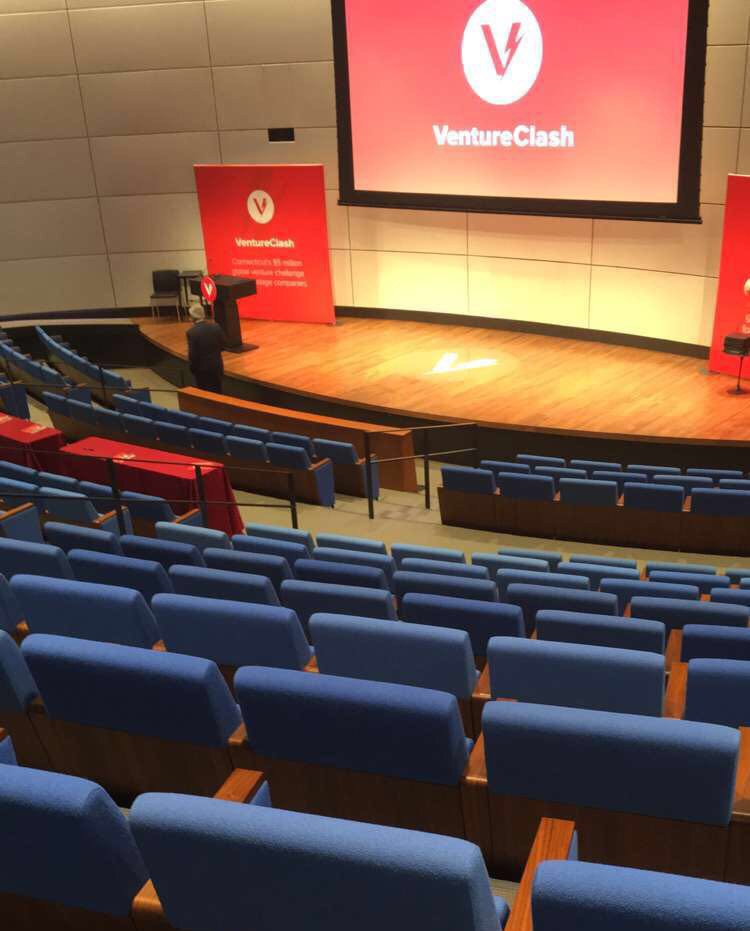
Rocel Beatriz Balmes
Last Thursday, Connecticut Innovations — the state’s leading source of financial support for early-stage companies and small businesses — held its inaugural VentureClash Live Pitch Competition.
Eleven finalists competed at Yale’s School of Management for a grand prize of $1.5 million in capital and an additional grant of up to $100,000. Dream Payments, a cloud-based payment platform, took home first place.
Participants were chosen from a pool of over 200 startup financial and health technology companies over the past six months, and keynote speakers at the event included Chief Technology Officer of Priceline.com — the “Name Your Own Price” internet service — Scott Case, who addressed the budding entrepreneurs as the “heroes” of the afternoon.
“The entrepreneurs are at the center of everything,” Case said in his address. “There are investors here and big companies here, but none of this happens without the founders who take the risks and put themselves out there every day and build their companies.”
When it was time to take to the stage, each finalist had five minutes to make their pitch, followed by a five-minute question and answer section. From California to France to Israel, early-stage companies from around the globe took the opportunity to present to a live audience of over 150 attendees. Among the audience was a panel of six judges, comprised of leading financial and health experts representing athenahealth, Inc., Kepha Partners, Oak HC/Ft, Point72 Ventures, Magellan Health and Canaan Partners.
The competition started off with Hong-Kong-based company AMP Credit Technologies, which offers a technological platform that allows banks and small loaning businesses the opportunity to make automated, paperless loan origination a reality. CEO Thomas Deluca emphasized that the system would be easily integrated into already-existing banking information, making credit assessment, loan repayment and risk portfolio management easier and more efficient.
Other competitors included Belgium-based LindaCare, which endorsed OnePulse, a remote-monitoring system that gives health practitioners a unified view of a particular patient’s history of tele-monitored health alerts and follow-up background to help improve chronic disease care. Along those same lines, CSIS Director Aengus Moran presented his company’s case for a patient-centered clinical decision support software.
The Irish company uses a combination of integrated information systems and clinician support that results in a platform which effectively reviews patient medications, integrates into existing health care information systems and is accessible to clinicians and administrators without much training.
Deviating from the banking and health tech companies, U.K.-based Hubbub advocated for SponsorCraft, a system focused on acquiring and retaining donors for nonprofit fundraising.
“We’re … a little bit less Fintech, and a little bit more Funtech,” said Jonathan May, co-founder of the company. “I spent my life as a child fundraising money for charities, schools, universities and startups … Fundraising is a funnel. You need to look at engagement, acquisition, growth and retentions strategies.”
Capitalizing on social media, he highlighted how his company has evolved and helped change the landscape and concept of giving in a revolutionary way. The company, May said, uses social data mining to subdivide databases that recognize viable prospects with white-label crowdfunding and digital-giving tools to increase donor conversion and retention.
With costumers like Oxford University, the University of London and the University of Southampton, Hubbub is looking to expand to the U.S., first by entering the market via universities, and later expanding to nonprofit agencies.
“When you give, you give online and what happens when you do that is you share that with other people like you,” he said. “There is a huge transition right now from direct mail and phones, to the digital space.”
As the event came to a close, May’s end-goal came $1 million closer to being achieved as his company won first-runner-up for the contest.
The whopping $1.5 million, however, went to Brent Ho-Young’s early-stage company Dream Payments. The system itself is a “payments cloud” that banks, small businesses and a variety of other financial institutions can use to deliver mobile payment acceptance solutions to their customers.
“This is as powerful as a register in a retail store, but it’s mobile, it’s low-cost and it can support any type of mobile wallet, Europay, MasterCard and Visa (EMV) chip technology,” Ho-Young said. “The key thing for us is that we see a universe of billions of devices out there that, as long as they can connect to the Internet, we can secure them and process payments from that. That could be a wearable, that could be a connected fridge in your break room, it doesn’t matter. We can power them.”
Dream Payments is headquartered in Canada, but counts multiple American banks among its clientele, such as TD and Chase banks.
At the end of the competition, however, win or lose, it became startlingly clear that the very presence of these companies in Connecticut sent a vital message to the rest of the nation.
“This particular program has generated a lot of interest within our state,” Gov. Dannel P. Malloy said at the competition. “It’s allowed us to reach out to a lot of individuals and organizations … and it is just one more tool that we’ve used to ensure that people understand that Connecticut is not only open for business, not only inviting that business, but we’re partners in so many of those businesses.”
Four runners-up received $500,000 and a grant of up to $50,000.







